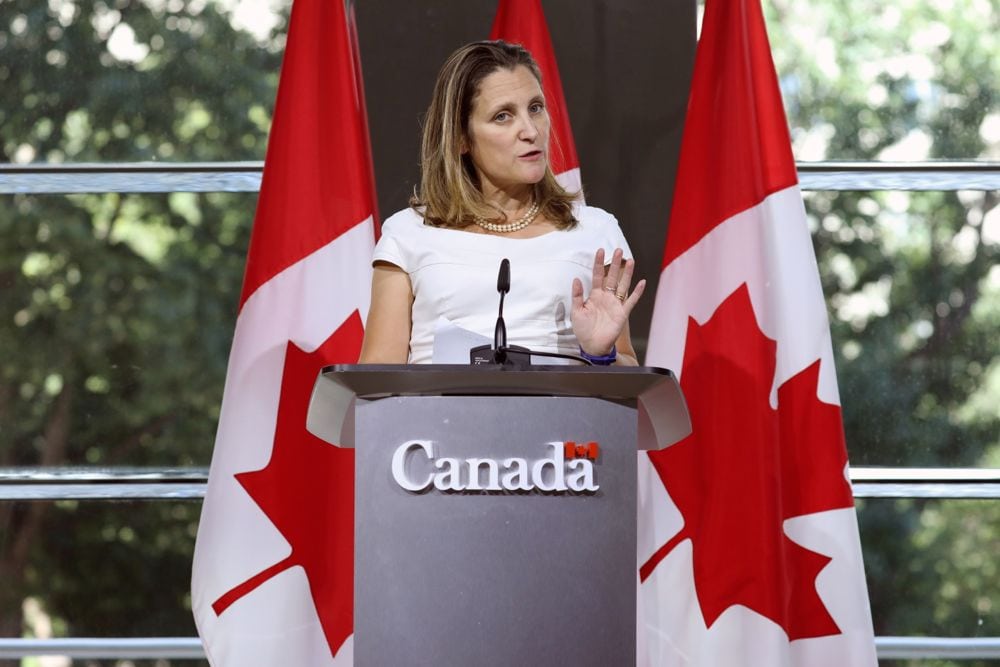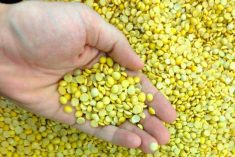Despite a previous statement from her ministry, Canada’s finance minister says a bill standardizing the tax treatment of farm transfers is now officially on the books.
However, while Bill C-208 is now in federal tax law, further amendments are en route to plug legal loopholes the bill may have opened.
Finance Minister Chrystia Freeland on Monday issued a statement that “seeks to bring clarity” in the wake of a June 30 finance department statement, which in turn had followed passage through Parliament — and, on June 29, royal assent — for C-208.
Read Also

New trade map takes shape in Davos as world adjusts to Trump tariffs
Global trade patterns are shifting in the face of tariff threats from the United States.
C-208, a private member’s bill spearheaded by western Manitoba Conservative MP Larry Maguire, was meant to amend the Income Tax Act to exclude sales of farms and other small businesses to adult children or grandchildren from current federal anti-avoidance rules.
In its June 30 statement, the finance department had said the government would “introduce legislation to clarify that these amendments would apply at the beginning of the next taxation year, starting on Jan. 1, 2022.”
But Freeland, in her new statement Monday, said instead that the changes contained in C-208 “now apply in law” within the Income Tax Act.
“We fully support genuine intergenerational share transfers and regret recent uncertainty that we have caused,” she said Monday. “Bill C-208 was voted on by Parliament and received royal assent. The law is the law.”
That said, she added that the minority Liberal government plans to draft further amendments and put them forward for consultations. The additional amendments to the Income Tax Act would “honour the spirit” of C-208, while “safeguarding against any unintended tax avoidance loopholes that may have been created.”
The further amendments, she said, will be “to make sure that (C-208) facilitates genuine intergenerational transfers and is not used for artificial tax planning purposes.”
After consultations, the government’s amendments would be introduced in a separate bill and would apply either upon the date of publication of that bill’s final draft or on Nov. 1 this year, whichever comes later.
‘Surplus stripping’
Maguire had brought forward C-208 as a remedy in cases where a person sold a small business or farm to a child or grandchild and the difference between the sale price and the original purchase price was deemed a dividend under pre-C-208 tax law.
If a business instead was sold to a non-family member, he said, the sale under pre-C-208 tax law was deemed a capital gain — and taxed at a lower rate.
In excluding intergenerational sales of farms and small businesses, Freeland said Monday, C-208 may “inadvertently permit” business owners the opportunity for “surplus stripping.”
That term refers to cases in which dividends are converted to capital gains to take advantage of a lower tax rate “without any genuine transfer of the business actually taking place.”
The pre-C-208 anti-avoidance rule was meant to prevent business owners from just removing earnings from their corporations by using a sale to a “linked” corporation — such as that of a close family member — as a basis to do so.
The government’s further amendments, when passed, would set up a requirement to transfer both “legal and factual control of the corporation carrying on the business” from the parent to the child or grandchild.
The further amendments would also lay out the level of ownership in the corporation carrying on the business that a parent can maintain for a “reasonable” time after the transfer.
They would also clarify the requirements and timeline for a parent to transition their involvement in the business to the next generation, as well as the level of involvement of the child or grandchild in the business after the transfer, Freeland said. — Glacier FarmMedia Network
















